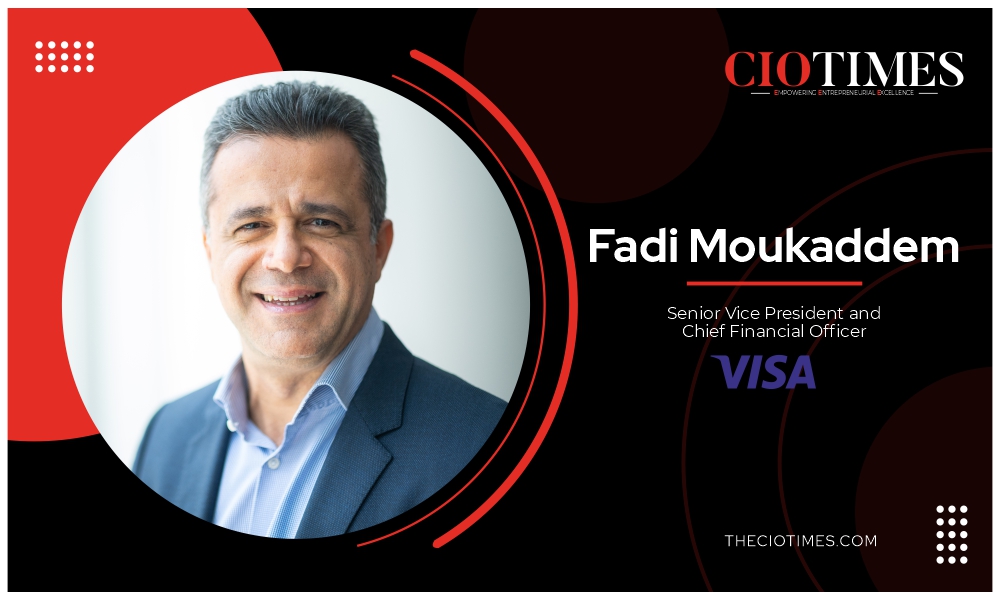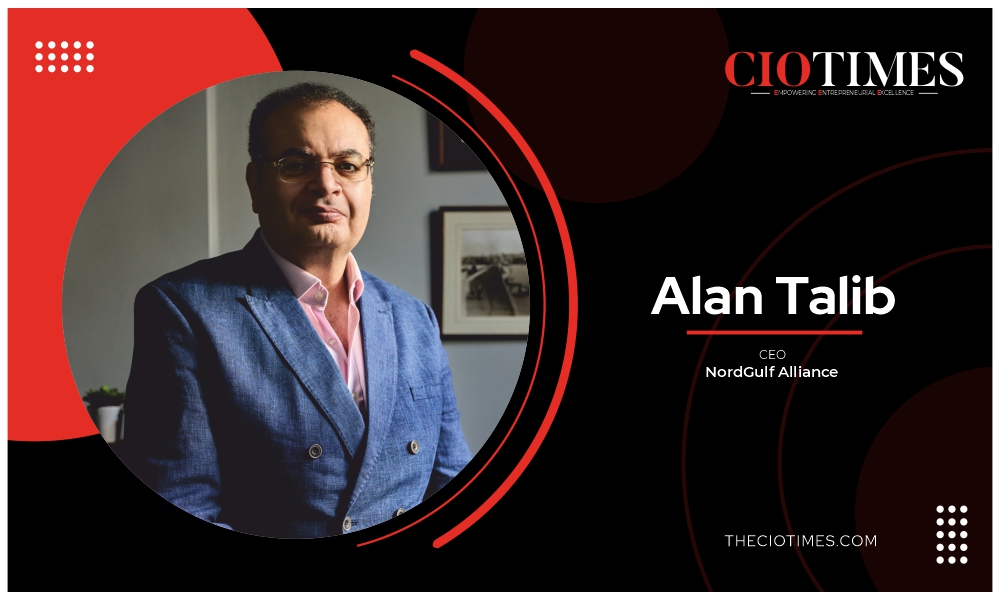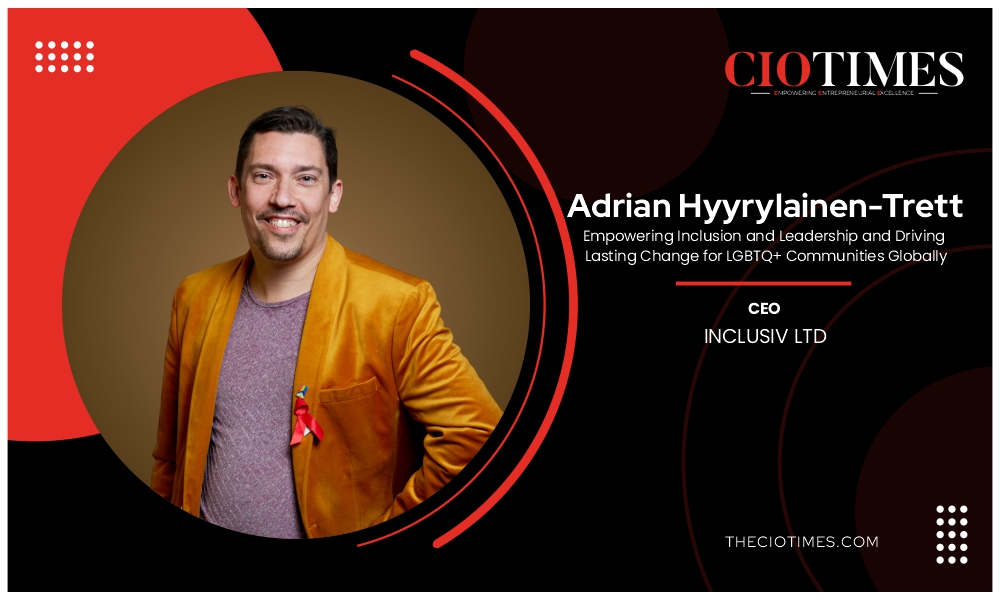For Fadi Moukaddem, Senior Vice President and Chief Financial Officer for Visa’s Central and Eastern Europe, Middle East, and Africa (CEMEA) region, the adage ‘Where there is a will, there is a way’ has always carried weight. More than a simple saying, these words accurately reflect his enduring belief in the power of venturing boldly into the unknown, even when the path forward is yet to be built.
This has been the driving force behind Moukaddem’s remarkable career, shaping him into a visionary financial and business strategist who looks beyond the traditional track of finance to actively seek out the next frontiers of innovation.
Moukaddem describes his professional journey as having started unconventionally. He explains, “Following my graduation from Finance at Saint Joseph University in Lebanon, I took a role as a financial analyst in Africa for a large family conglomerate. This experience was an adventure, equipping me with entrepreneurial agility, a profound understanding of the value of money from an owner’s perspective, and the critical importance of swift decision-making.”
Four years later, after being promoted to Deputy CFO at a young age, Moukaddem was keen to seek out new horizons. Specifically, he wanted to experience the structured environment of a global company. Deciding to join Finnish multinational telecommunications corporation Nokia, his experience in Africa proved invaluable: “I expanded into markets like Ethiopia and Libya; I was also entrusted with building the Kuwait business from the ground up and later managed a larger cluster in Qatar for the Gulf area.”
Over the following years, Moukaddem pivoted to consumer goods, joining American multinational PepsiCo as Executive Director for Financial Planning and Strategy. In this fast-moving environment, he gained deep insights into brand positioning and leadership.
Then, twelve years ago, Moukaddem found his professional home at Visa. This pivotal moment in his career came with the greatest challenge yet: the establishment of a dedicated CEMEA presence. The opportunity of building Visa’s regional impact from the ground up allowed Moukaddem to synthesize all his diverse experiences, from the entrepreneurial drive of his time in Africa and B2B expansion expertise from Nokia to the brand acumen he gained at PepsiCo.
“When I joined Visa over a decade ago, the CEMEA region, as it exists today, was nascent. I was directly tasked with helping to forge the comprehensive strategy required to grow the business across a highly diverse set of markets. This invaluable experience has instilled in me a proactive, forward-looking mindset, enabling me to identify emerging opportunities, champion strategic investments in new technologies and markets, and ensure our financial architecture supports rapid, sustainable innovation across the entire organization,” he reflects.
The financial architect behind a “network of networks”
Moukaddem plays a central role in shaping Visa’s financial strategy, helping drive sustainable growth, operational excellence, and continued leadership across the global payments landscape.This architectural vision is intrinsically linked to Visa’s core purpose and its unique value proposition.
For over 60 years, Visa’s purpose has been clear: to uplift everyone, everywhere, by being the best way to pay and be paid. Visa’s enduring vision of connectivity still stands today, manifesting itself in a distinct value proposition that Moukaddem describes as a sophisticated network of networks.
“We are striving to provide a single, seamless connection point for money movement between consumers, merchants, businesses, and governments across hundreds of countries and territories. In fiscal year 2024 alone, this network processed nearly 234 billion transactions globally, underscoring our scale and reach,” says Moukaddem.
As Visa’s regional CFO, he plays a key role in shaping strategy and ensuring financial excellence across the region.. He and his team are deeply embedded as strategic collaborators with their partners, championing shared innovation and growth.
This collaborative spirit is fueled by what truly inspires and motivates Moukaddem: connecting the dots between complex financial data and real-world strategic outcomes. His purpose lies in contributing to the economic empowerment of diverse communities, innovating within the rapidly evolving payments landscape, and collaborating with brilliant minds across different cultures.
He offers a compelling example of this commitment: “At Visa, we are actively working to bring more individuals and small businesses into the formal economy, underscored by our pledge to invest $1 billion in Africa by 2027. Just recently, we launched Visa Pay in the Democratic Republic of Congo (DRC). This is a mobile-first solution designed to provide access to digital payments and facilitate interoperable money movement for both banked and unbanked consumers, with the aim to stimulate economic growth and expand access.”
Moukaddem emphasizes the profound reward of this work, adding, “Seeing the direct impact of Visa’s innovations on market development and consumer behavior across vast and varied regions is profoundly rewarding.”
Strategic collaboration and ecosystem investments
Moukaddem believes collaboration is more than a buzzword; it’s foundational to success. He views himself as a bridge between numbers and strategy, ensuring every decision aligns with the company’s broader mission.
He explains his approach: “Essentially, my contribution is to bring a rigorous financial lens to every discussion, providing comprehensive analysis, assessing risks, and optimizing resource allocation to achieve our strategic objectives.”
This rigorous financial lens and shared understanding across the leadership team enables the executive team to make decisions that balance short-term performance with long-term resilience. At the heart of this is Visa’s network of networks strategy, a blueprint for expanding the reach of digital payments to every corner of the globe.
Moukaddem’s early career in telecoms taught him a lesson that still shapes his thinking today: “The more our partners sell and expand, the more robust infrastructure, innovative solutions, and dedicated support they require.”
This symbiotic relationship drives Visa’s proactive investment in partner success, fostering mutual growth across an ecosystem of banks, fintech, payment facilitators, merchants, and governments. His financial planning is meticulously designed to connect these diverse participants, ensuring the seamless, secure, and efficient flow of money that continues to fuel Visa’s sustained leadership.
In an industry defined by rapid change, Moukaddem believes that risk management has to evolve as quickly as innovation itself. From his perspective, security is both a critical defensive layer and a prerequisite to agility. He has adapted Visa’s enterprise risk management framework to respond to shifting regulations and geopolitical uncertainty, positioning the company as a trusted partner to governments and central banks.
One example he cites is Ukraine, where Visa helped maintain secure digital payments during the war, strengthened the Diia e-government platform for 20 million people, and supported banking resilience by securing Starlink terminals.
This proactive approach extends to strategic expansion, particularly vital in uncertain times. Moukaddem explains, “A key part of our strategy… is our expansion into emerging areas that focus on driving digitization beyond traditional consumer payments. This includes business-to-business (B2B), business-to-consumer (B2C), and government-to-consumer (G2C) payments, which collectively represent more than $200 trillion in spend annually – a truly substantial prospect. By diversifying revenue streams, we build a more stable financial foundation.”
To further fortify its offering and support this strategic diversification, Visa also leverages its Value-Added Services (VAS). Moukaddem highlights its impact, adding, “These are products and solutions that help our clients and partners optimize their performance and create better experiences for their customers. In 2024 alone, we signed over 12,000 new deals and renewals for these services, showcasing their vast potential in action.”
Visa’s comprehensive services, including VAS, are built on a bedrock of trust and ever-evolving technological capabilities. Central to this is the AI-native Visa Protect suite. This powerful suite spans multiple solutions: Visa Risk Manager for enterprise-wide fraud detection, Visa Consumer Authentication Service for network-agnostic security, and Visa Provisioning Intelligence to stop fraud at the source. Additionally, Real-Time Payment Protect safeguards account-to-account transactions with instant scoring. These capabilities were further expanded through the acquisition of Featurespace, which brought the ARIC Risk Hub. This hub provides Visa with a real-time, 360-degree view of customer behavior across all payment channels, significantly enhancing fraud prevention.
Future of payments hinges on fintech partnerships
This secure foundation is what makes Visa an attractive partner for fintech worldwide, which Moukaddem views as a core growth engine in the payments ecosystem. To foster this growth, Visa has developed a comprehensive suite of programs designed to serve fintech innovation.
Moukaddem elaborates: “Our Fintech Fast Track program provides streamlined onboarding and turnkey access to our ecosystem partners, helping fintech launch new financial features quickly, while our Visa Ready certification program helps technology companies build and launch payment solutions that meet Visa’s global standards for security and functionality. This collaborative approach is working. In fiscal 2024, we signed over 650 commercial partnerships with fintech globally, an increase of 30 percent year over year.”
This commitment to partnership is evident in initiatives like the Africa Fintech Accelerator program of which he is a sponsor, launched in 2023, which has already supported over 60 startups (many led by women) with solutions spanning payments, lending, payroll, and social commerce.
Furthermore, strategic alliances with fintechs such as Chipper Cash and Djamo are significantly expanding the reach of digital payments. Chipper Cash, a leading virtual card issuer, has driven the issuance of millions of digital payment cards, while Djamo has issued two million Visa debit cards in just 18 months, offering users quick access with no monthly fees or overdraft charges. In each case, Visa’s secure infrastructure enables these partners to deliver inclusive, scalable solutions.
Moukaddem underscores the strategic importance of this approach: “By embracing this open partnership approach, we can ensure that we remain at the forefront of payments transformations, leveraging the agility of fintech to meet evolving consumer expectations while also furthering access and inclusion.”
Measuring the “return on innovation” from a finance lens
For a CFO, assessing the return on innovation is a nuanced process. Moukaddem describes it as demanding “a balanced scorecard approach that extends far beyond a simple payback period,” emphasizing that strategic value is equally, if not more, important.
He points to Visa’s Value-Added Services (VAS) as an illustrative example. While VAS delivered a clear financial win with a 17% year-over-year increase in performance in 2024, its true value also lies in fostering trust. This includes preventing billions of dollars of fraudulent transactions last year, safeguarding clients and reinforcing partners’ confidence in the Visa network.
Apart from immediate financial gains and trust, some returns on innovation are aimed squarely at the future. Visa Direct, for instance, which processed nearly 10 billion transactions in 2024 and connects to over 11 billion accounts worldwide, is more than a revenue stream today. Moukaddem views it as a strategic bet on the future of money movement and Visa’s position as a leader within it.
Ultimately, Moukaddem states, “the impact of our innovation is also reflected in enhanced client relationships. Our investments in client service are paying off by strengthening relationships where it counts most. This holistic view ensures we tap into the full strategic and financial benefit of our innovation efforts.”
Looking ahead: AI, stablecoins, and the next chapter at Visa
The future of payments, Moukaddem believes, will be shaped by two powerful trends. The first is Agentic AI-driven commerce. He notes, “According to PwC, AI is forecast to contribute 19% of the Middle East’s retail GDP by 2030, the highest share across all major sectors.”
Visa is already at the heart of this shift with AI-ready card credentials, enhanced security, and personalized controls through initiatives like Visa Intelligent Commerce.
The second is the rise of stablecoins, offering faster, cheaper cross-border transactions. Visa is piloting stablecoin-backed cards that bridge digital assets with everyday spending, making them accessible for mainstream commerce.
Over the next five years, Moukaddem envisions Visa fully realizing its network of networks ambition, solidifying its vision of being a secure connection point for money movement between any two endpoints worldwide. He affirms this commitment, stating, “I am committed to ensuring that we invest in the right solutions to capture the immense opportunity ahead in the ever-evolving payments landscape.”
Alongside technological advancements, nurturing the next generation of Visa talent is equally important to Moukaddem. With the company’s global workforce reaching 31,600 employees in 2024, he is focused on developing future finance leaders who can navigate an increasingly complex and exciting future, bringing seamless and secure payments to more people and in more markets – the trusted Visa way.
Read Fadi’s inspiring story in our newest edition




